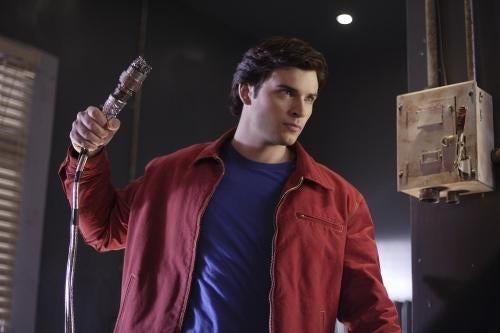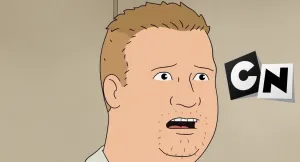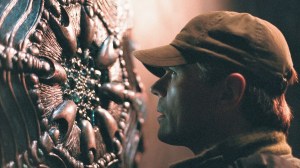This weekend marked 20 years since Smallville premiered on The WB, and it has been a decade since the series drew to a close on May 13, 2011. And while the team behind it — Tom Welling, Michael Rosenbaum, Al Gough, and Miles Millar — are looking at the possibility of returning to the world in the form of animation, during that time there has been fairly little Smallville content, and a new generation of DC TV that’s inspired by the show’s success. Millions of viewers tuned into the Superman prequel every week for years, but even its stars didn’t really think about how significant it was until fairly recently.
Videos by ComicBook.com
Today, Smallville: The Complete Series is coming to Blu-ray for the first time (marking the first physical Blu-ray release for some of the early seasons, too), along with new bonus features and a flood of enthusiasm for the series from fans and critics online. You can pick it up at a local retailer, or online here.
Series stars Tom Welling, Michael Rosenbaum, and Kristin Kreuk joined ComicBook to look back on the show, and tease a little of what’s to come.
ComicBook: At what point did you guys realize that this was just going to be forever? That you’re always going to have to answer questions about Smallville?
Kristin Kreuk: I don’t know that I ever thought about it. It just happened. It just happened that this became a massive show, and I’ve learned along the way that it means a lot to people.
Tom Welling: I mean, for me, it’s like “It’s the 20th anniversary of Smallville, so we’ve got to do all this press and talk to ComicBook.com.” and I’m like, “Why?” They’re like, “Well, people want to talk about it.”
I knew that when I watched the pilot of this episode, that this was something special, that this was going to last for a long time and it was going to be part of pop culture for quite a few years. I just felt like when I watched it, it was like watching a comic in a way, or watching a movie. Each episode was shot like a movie. It just felt like this is going to stand the test of time.
So for me, after seeing the pilot, I was like, “Wow, we’re in store for something very special here.” Did we know it would last 10 years? No, but I felt like this had some legs and it was that good. The quality was that good. All the pieces came together. It was a perfect storm of character and filmmaking and everything else. I think the world needed it. They needed some escape.
ComicBook: I watched the pilot again last night and then skipped forward to “Booster,” because I wanted to watch something Tom directed towards the end. It’s a wildly different show, obviously. For you guys, how aware were you guys of the picking up speed, and the way that they were starting to incorporate the wider DC mythology over the life of the show?
Tom Welling: I think I was probably more aware because I was there throughout. I mean, for me, there’s very much Lex being there, Lex not being there, Lana being there, Lana not being there, Lois coming in.

In many ways, looking back, there’s Smallville and then Metropolis. It’s almost two shows, you know what I mean? After five years, six years, it kind of transitioned into a different show, stylistically. The way we introduced characters and storylines, it became a little less character and a little more plot. We had the Red-Blue Blue blur, which I mean, come on, come on.
Michael Rosenbaum: You didn’t like that?
Tom Welling: I mean, the best part about that character was, almost all of his dialogue scenes were on a phone, with another actor who wasn’t there at the time, which is very convenient from an acting point of view. Anyway, that’s a whole other path we could to go down. But I very much lived the difference between season five and season six and seven, and then getting to 10 was very different, very different.
Kristin Kreuk: It might be, too, when they started introducing other superheroes. Because for a long time, there were just Kryptonite-infected things.
Tom Welling: I totally agree with you, in so many funny ways. If for some reason, Lana was still there with Clark, and then Hawkman showed up, and Clark was standing next to Lana…I would’ve loved to seen Lana’s response to Hawkman. You know what I mean?
Because there has to be this acceptance that Clark innately has to have from this world, but Lana would have been like, “Ah, I don’t know. I don’t know…!” That would have been a fun relationship to do.
Michael Rosenbaum:
But it fits in the world, because if there’s a character like you who comes from [another] planet, there’s got to be other people around…
Tom Welling: Yeah, acceptance.
Michael Rosenbaum: Acceptance and it’s also got to be, there’s got to be The Flash when they came in, and Aquaman. It was interesting. It just gave it a little bit more of a taste. It was just a little different, and you have to evolve as a show. I think it started out just as freak of the week, and then we started getting the storytelling more about subtext and character backstory and all that, then it sort of evolved into whatever it evolved to. Without me or Kristin.
Tom Welling: Which ironically, the three of us are here now celebrating the show. There’s a beautiful irony to the fact that, yes, I may have done the ten [seasons], you guys did the seven, whatever, but it’s the three of us who you’re talking to about it, because we’re the core.
Michael Rosenbaum: It’s exciting talking about it. It’s exciting going back, even though we don’t remember everything. It was a real big chapter in all our lives, a big part of our lives.
Tom Welling: A third of my life! At the time, I spent a third of my life on that show.
Michael Rosenbaum: Natalie, our makeup artist, knew us probably more than our own parents, wouldn’t you say, Kristin?
Kristin Kreuk: Maybe actually.
Michael Rosenbaum: It’s pretty profound.
Tom Welling: She could definitely read our minds.
Michael Rosenbaum: Yeah. Our relationships with people…I mean, you’re spending so much time with them on set. It was definitely a chapter in our lives.
ComicBook: Now I have to ask the thing that everybody always asks, which is now that you’ve got The Flash movie opening up yet another multiverse, would you guys ever entertain coming back to these roles?
Michael Rosenbaum: For me, again, it comes down to integrity of the character. It comes down to, is this good quality, is it something that I could shine in? If this is something that if I’m a part of, does it makes sense? There’s a lot of variables, but I’m always open to things.

People go, “Why aren’t you the new Lex Luthor? Why aren’t you Jesse Eisenberg?” or something. I go, “They don’t ask me.” Maybe one day when I’m a little older, they’ll give me an audition, but I’ve never been asked to do it. I’ve never been auditioned for it. That’s just how it is. So it’s not all our choice, either.
Tom Welling: It’s not a choice. And you have to understand that the film and television side of DC and Warner Bros. is very combative. I mean, I’m not outing anybody, but when they do movies, they don’t want to use TV people. It’s just very clear. So that does happen.
I spent a lot of time answering this question. But, like, the answer is yes. If somebody [wants us]…let’s talk about it. You know what I mean? Because when I say no, everybody gets upset.
Michael Rosenbaum: So let’s talk about it.
Tom Welling: So let’s just…I don’t know. I think Lana Lang should have her own feature, I don’t know. [Laughs]
Michael Rosenbaum: I think if it’s the right project and it comes along and it makes sense, of course. We’re not stupid. You just have to make sure that it’s something you really want to do and something that makes sense.
ComicBook: I do think that there’s this temptation by a lot of folks to get into the genre machine, and just crank out a bunch of movies in Vancouver that are direct to streaming. All of you guys seem to have chosen to go the other way. You do a lot of really smart projects, a lot of projects that are distanced from the genre stuff. Is that a conscious choice or is that just what appeals to you?
Kristin Kreuk: I feel like you and I have talked about this a bit before, but I think for me personally, when I watch TV, I’m mostly watching non-genre. I mean, that’s changing, there’s some genre stuff that I really enjoy, and I love reading genre, but I think coming out of Smallville and Beauty and the Beast for me, looking for something that was less genre was really appealing.
The stakes are just so different, and you can explore nuance, and you don’t have to look at things as evil and good or life and death. You can kind of dig into a lot more complexity, and that’s where I wanted to kind of get into, not that you can’t do that in genre. You can, and people do all the time, but it’s not as common.
Michael Rosenbaum: Yeah, I don’t think I’m… For me, and maybe I speak for you, it’s not like we choose to veer away from genre. I think we’re just looking for good quality projects, and whatever those bring. I did Guardians of the Galaxy vol. 2, and will I do another one? Sure, I would. Would I do a DC movie? Sure. Would I do a crime? Would I do a comedy? Whatever appeals to me at the time, I’m open to that.
Tom Welling: It’s also a challenge because — and like, “poor us,” right? — but they want you to continue to do what you’ve been successful at once you become successful and that’s fine, but that’s probably not why you became successful having that mentality. So we have different interests. We were all very proud of what we all did on this show, but we also had vastly different interests. We’re not just these guys. We’re trying to do other things as well. A lot of fans of Smallville want us to continue to be those people, but there’s other things for us to explore.
Michael Rosenbaum: By the way, we may be those people again. I’m not speaking for him, but would I play Lex again? Sure. It’s the right part. It’s the right… Of course. I mean, if Tim Burton called me up, I wouldn’t even read the script. I’m like, “I’m in. Game on.” You don’t have to tell me twice. But I think it’s situational.
Tom Welling: We’re also… Kristin, you’ll be getting a call from us, but we’re working on the animated series with Al and Miles, where we’re going to continue Smallville on and be the voice.
Michael Rosenbaum: Well, we have a yes, we have a pitch, but we can’t really talk about it. We can’t talk about it, but we’re working on it…
Tom Welling: If we call you, answer the call.
Michael Rosenbaum: Yes.
Tom Welling: We have an idea.
Michael Rosenbaum: It’s something that we’re excited about, but we’re going to talk to…
Tom Welling: I thought we could talk about it.
Michael Rosenbaum: No, we can’t, really. We’re going to talk to Warner Bros. about it and then once we talk to Warner Bros., then hopefully they’ll want to do it….But it’s fine. We’re excited about it and we’ve been working on it. We’ll see what happens.
ComicBook: Is it strange looking back at some of the stuff from the early seasons and saying, “Holy s–t, my craft was completely different and I was a kid?”

Kristin Kreuk: It’s horrifying. Also, beyond that though, it’s crazy to see, just for me looking back at myself, how my voice was so small. It’s like a totally different human. To see that person, it’s a weird experience. Maybe now this generation will have this experience, but our generation didn’t have videos of us forever. So just being able to look back, it’s a strange experience. Like, “Who is that human being?” It’s crazy.
Michael Rosenbaum: Yeah. I look at it and I can appreciate what I did, but I was also young as well. I wasn’t as young as Kristin, but my voice changed too. I was like 26, and then I look at it as “this is who you were then.”
Would I play it differently now? I don’t know. I mean, again, it was that situation. It was that time. I was the right person at that time. Now, I would be hopefully a little more mature of a character, and a little grander, if you will — a little more intense. I think I could do much more now that I’m older. That I don’t think of that as much, but I look back and I appreciate what we all did.
Tom Welling: I mean, for me, it’s the stars aligning, for the best and the worst. To talk about what we would have done differently, I think that’s a fool’s endeavor, to be honest. I think everything that was right and wrong with us worked, and that’s why we were able to do what we did.
ComicBook: Do you think that this show could happen now? There’s a moment in the pilot, when the younger version of Lana sees her parents obliterated by this asteroid. It’s supposed to be this heart-wrenching moment, but in a post-James Gunn world, it felt like a gag from The Suicide Squad. So do you think that this show and kind of the earnestness that it brought could still work now?
Kristin Kreuk: I was just saying in our other interview, I don’t know. The earnestness feels of a time, but I think it’s changing again. I think when you see something like Ted Lasso, I think that earnestness is coming back en vogue — that we’re willing to kind of “go there” with the earnestness. But for a long time, I thought there was much more cynicism, and Smallville‘s not very cynical.
Michael Rosenbaum: I think she’s said that well. I just think the show, it was a different time period. We had no social media.
Tom Welling: It just was what it was, when it was.
Michael Rosenbaum: Could it work? Sure, it could work. There’s a couple of episodes where you’re like, “Wow, this could really work now,” but there are some episodes that you’re like, “This wouldn’t fit.” So I think it’s a mix and match, but I think a show like this was special, and it was of its own time.
But there’ll be spawns. There’s always spawns. There’s other shows that have similarities, that take what worked for us and use it for them. That’s how it works.
Tom Welling: I think it was just sort of the stars aligned for all of us at that time. Whether it would happen again…I hope it does for some other people, because I think it was a great show, that had some really good values. Revisiting it, we probably could have gone a little bit better with some of it, but I’m very proud of all of us and what we accomplished.
Michael Rosenbaum: When people come up to us at conventions around the streets and they’re like, “My dad, we watched that, and he’s not alive now, but we watched that show together. It was our moment…” That’s what really it’s all about. It’s connection. The connection to the characters, the connection to the show, with the story.
That’s what I’m mostly proud of, that Smallville continues, whether it’s on Hulu or the new Blu-ray, we continue and we’re all honored to be able to continue with it.
Note: If you purchase one of the awesome, independently chosen products featured here, we may earn a small commission from the retailer. Thank you for your support.








